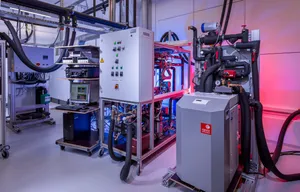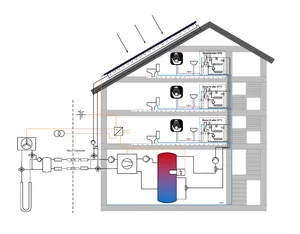The Thermal energy systems research group develops and investigates regenerative heat supply concepts with a focus on residential buildings. The goal is to increase efficiency and decarbonize heat supply by combining central and decentralized components and integrating renewable energy sources through innovative control strategies.
Research focus: heat distribution in multi-family buildings
We explore multivalent heating systems that optimally combine heat pumps, geothermal sources, PVT collectors, thermal storage units, and electrically powered heat generators. The focus is on the system integration of innovative components and the reduction of CO₂ emissions – all the way to net-zero.
A holistic system approach is taken, covering the entire building energy system, including all components such as domestic hot water heaters, thermal storage tanks, and collectors. Our findings are also integrated into other research groups and system developments at ISFH.
Applications: sustainable heat supply for residential districts
For densely populated multi-family residential districts, we research highly efficient systems based on low-temperature district heating (cold local heating), combining near-surface geothermal energy (e.g., geothermal probes) and solar thermal sources (e.g., PVT collectors) on both the source and sink sides.
This coupling enables smaller-scale geothermal systems, improving not only economic viability and environmental sustainability but also enabling regenerative heat supply in scenarios where it would otherwise not be feasible.
Applications: single- and multi-family homes with low supply temperatures
We investigate commercially available and newly developed heating systems for existing single- and multi-family homes. These systems are analyzed using:
- Hardware-in-the-loop test benches in the lab
- Field measurements with minimally invasive sensor technology
- System simulations using TRNSYS
A particular focus lies on the efficient and hygienic domestic hot water supply using flow-through water heaters.


Projects
Trans2NT-TWW
Transition to low-temperature drinking water systems
UrbanGroundHeat
Heat transition in existing urban districts: Deployment of shallow geothermal energy depending on technical, economic and legal constraints
WoSta 4.0
Development of smart heat interface units and demonstration of networked, highly efficient, regenerative heat supply for Multi-Family Houses, WoSta4.0
TA-DTE-XL
Technical requirements of instantaneous water heaters increasing energy efficiency and comfort of big, renewable heat supply systems; Sub-project: Laboratory measurements and simulations
integraTE-XL
Initiative for the market establishment and dissemination of thermal-electric energy supply systems using PVT collectors and heat pumps for existing large apartment buildings and commercial properties
Geo-Resume
Sustainable operation of large geothermal heat pump systems by regeneration with solar, environmental and waste heat
Contact person
Dr. Raphael Niepelt
Head of Solar system technology department